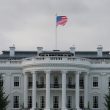Via Morgan Stanley:
Just When You Thought it Was Dead, Inflation Returns (Joachim Fels/Charles Goodhart)
A strong economic rebound in China and the US, adverse supply shocks in agriculture and worries about swelling central bank balance sheets lead to a sharp rise in actual and expected global inflation. Central banks don’t dare to respond, given high debt levels and financial fragilities, and either continue to ignore or abandon their inflation targets. Rising wheat prices lead to bread riots. In the UK, Chancellor Osborne advises the British to eat oatcakes instead.
Debt Cancellation (Spyros Andreopoulos)
The US Treasury, Japan’s Ministry of Finance and Her Majesty’s Treasury jointly announce that the Treasury debt held by the Federal Reserve, Bank of Japan and Bank of England respectively as a consequence of QE purchases are cancelled, and that these central banks will operate with negative equity until further notice. As a consequence, government debt/GDP ratios are brought down by 11pp, 18pp and 25pp, respectively. Ratings agencies love it, as does the bond market – until it realizes that large-scale debt monetization has just taken place, and sells off sharply.
US Over the Cliff and Likes it (Vincent Reinhart)
The US goes over the fiscal cliff and likes it. A deal delayed to early 2013 in which politicians compromise because of concerns about financial markets would resolve uncertainty more assuredly than the baseline of stop-gap legislation followed by a plan later in the year. As a consequence, confidence gets a boost, pent-up business investment kicks in and the labour market improves more rapidly.
US Housing Stalls Out (David Greenlaw)
The burgeoning housing recovery in the US begins to stall due to credit tightening. There is still no private mortgage market at this point and financial problems are brewing at the FHA which could lead to a dramatic reduction in credit availability for first-time homebuyers. Meanwhile, putback risk continues to cause originators to increase scrutiny for conforming loans.
BoJ Leads World in Adopting Rule-Based Monetary Policy, but Exit from Deflation Lags (Robert Feldman/Takeshi Yamaguchi)
Following a change in its leadership, the Bank of Japan switches to target the ex-food ex-energy CPI, adopts price level targeting to make up for past deflation, and implements a base money growth rule based on deviations of the actual CPI from the desired path. However, the targeted CPI measure remains negative year on year in December 2013, and the BoJ maintains aggressive policy into 2014 and beyond.
BoJ First to Buy Euro Area Bonds, ECB Left Watching and Waiting (Elga Bartsch)
The Bank of Japan, as part of its more aggressive policy stance to fight deflation (see above), starts to acquire euro area government bonds in order to push down the yen before the ECB is able to activate its OMT program. While the BoJ acts, the ECB waits in vain for the Spanish government to apply for an ESM credit line and OMT bond purchases. The BoJ focuses its purchases on ESM/EFSF bonds as well as higher-yielding core and large peripheral markets and thus effectively becomes a lender of last resort for the euro area.
Italian Politics Revives the CRIC Cycle and Triggers OMT (Elga Bartsch/Daniele Antonucci)
A lively anti-austerity campaign in the run-up to the early elections causes investors to seriously worry as to whether Italy could be contemplating an exit from the euro. The convertibility risk, which the ECB’s OMT announcement had reduced, returns and Italy is forced to seek an ESM credit line and becomes the first country to trigger the OMT. Unfortunately, the damage has been done as markets now believe that the convertibility risk is political rather than monetary. Investors sell the euro and peripheral assets and stock up on tinned food and mood-boosting pills.
From ‘Grexit’ to ‘Brixit’ (Elga Bartsch)
Financial markets come round to the idea that Greece will stay in the euro for the foreseeable future. Instead, investors are getting increasingly concerned about the UK’s political stance on Europe, especially in view of a possible referendum on EU membership. Polls during 1H13 start to suggest that an exit of the UK from the EU is now seen as more likely than an exit of Greece from the euro. The London property market wobbles as financial institutions start making contingency plans for moving employees to Frankfurt and Paris.
The UK Formally Gives Up the Fight Against Inflation (Melanie Baker)
As inflation looks set to remain well above 2% for yet another year, the government begins to fear that targeting inflation at the 2% level will mean an abrupt end to very low interest rates in the not-too-distant future...or a sharp loss of Bank of England credibility. MPs increasingly argue that embedding a bit more inflation might be a good thing for helping the UK economy out of its difficulties. The government raises the MPC’s inflation target and, for good measure, it merges the Monetary Policy Committee and Financial Policy Committee together.
Recession Returns to Australia (Gerard Minack)
Australia hasn't had a recession for 21 years - arguably, one is overdue. Markets view the risk as low: fixed income markets are pricing in only 1-2 more rate cuts, and equities have re-rated through 2012.
Not the Right Green Shoots in EM (Manoj Pradhan)
EM green shoots develop further, but from the ‘wrong’ sources of growth. Better DM growth and/or an unwinding of the shock to global exports stabilizes EM exports and hence production. Complacency sets in and structural reforms to move away from the broken, export-investment-led model are put on the back-burner. The result? EM growth deteriorates shortly after.
China’s Shocking Tightening (Helen Qiao)
The Chinese government inadvertently tightens financial conditions aggressively by applying a ‘shock therapy’ during the early stage of the recovery. Off-balance sheet lending activities are banned and forced to roll back onto commercial banks’ balance sheets, causing a major liquidity freeze in the system. More credit defaults occur, giving rise to higher systemic risks. The economic recovery unravels.
The AXJ Productivity Booster (Chetan Ahya)
Policy-makers in Asia ex-Japan move aggressively to implement policy reforms, boosting the region’s productivity dynamic. China accelerates the move up the value chain and boosts consumption growth; India unveils more measures to lift investment in the economy; and Indonesia initiates reforms which improve the competitiveness of the non-commodity sectors. This raises productivity growth in the region, which has slowed significantly since the crisis, and results in higher corporate profitability.
Mexico’s Moment Arrives in its Long-Troubled Oil and Gas Industry (Gray Newman/Luis Arcentales)
Newly inaugurated President Enrique Peña Nieto surprises with a passage of aggressive constitutional change in Mexico’s oil and gas industry – he gains the political upper hand in energy and fiscal reform by starting his six-year term with a big boost in social programs and promises that energy/fiscal reform will provide even more revenues for social spending. MXN rallies on the prospects of a new FDI wave and the sovereign sees an upgrade.
Brazilian Policy Shifts from Stimulating Demand to Boosting Supply, with Ambitious Infrastructure Program (Gray Newman/Arthur Carvalho)
President Dilma Rousseff surprises most Brazil watchers as she follows through on her promise of an ambitious infrastructure program, lifting the globe’s sixth-largest economy from near the bottom of the globe’s infrastructure rankings. The technical details show attractive IRR triggering large investment inflows from abroad. BRL rallies more than expected on the news.
Turkey Goes Boringly Orthodox in Rates (Tevfik Aksoy)
The Central Bank of Turkey switches back to a conventional, orthodox and less exciting monetary policy in 2013. It removes the non-standard and creative tools designed to achieve inflation and financial stability goals at the same time. As a consequence, it faces new challenges of currency appreciation, currency volatility and no meaningful decline in the current account deficit. The experiment fails and policy switches back to non-conventional measures later in the year in an attempt to recoup the loss of credibility.
Back in the USSR (Jacob Nell)
Putin is successful in enticing Ukraine into the Eurasian Customs Union in return for energy subsidies which reduce its balance of payments financing need to a level which requires neither painful policy adjustment nor a sharp FX adjustment. This closes the door on EU entry for Ukraine, since you can’t be a member of two customs unions at once, and leads to economic reintegration of the main post-Soviet states – Russia, Ukraine, Kazakhstan and Belarus. The removal of trade and investment barriers – particularly if accompanied by a pro-investment, pro-market set of Russian-led policies – triggers higher growth across the region, while Russian energy subsidies would stabilize the hyrvnia and ruble.













